Also see my more recent Banana Pi R4 Review.
¶ Banana Pi BPI-R3
The Sinovoip Banana Pi BPI-R3 test device comes in an esd-bag in a carton. There are no accessories, no cables no quicktstart, just the device. In the European market it is available e.g. at Amazon as a Kit or without a case. The Kit also includes:
- Power supply
- Metal Casing
- 8 x Antenna
- 8 x pigtail
- serial adapter
The case can also be bought seperately.
Prices vary a bit, mostly they are below 200 € for a kit.
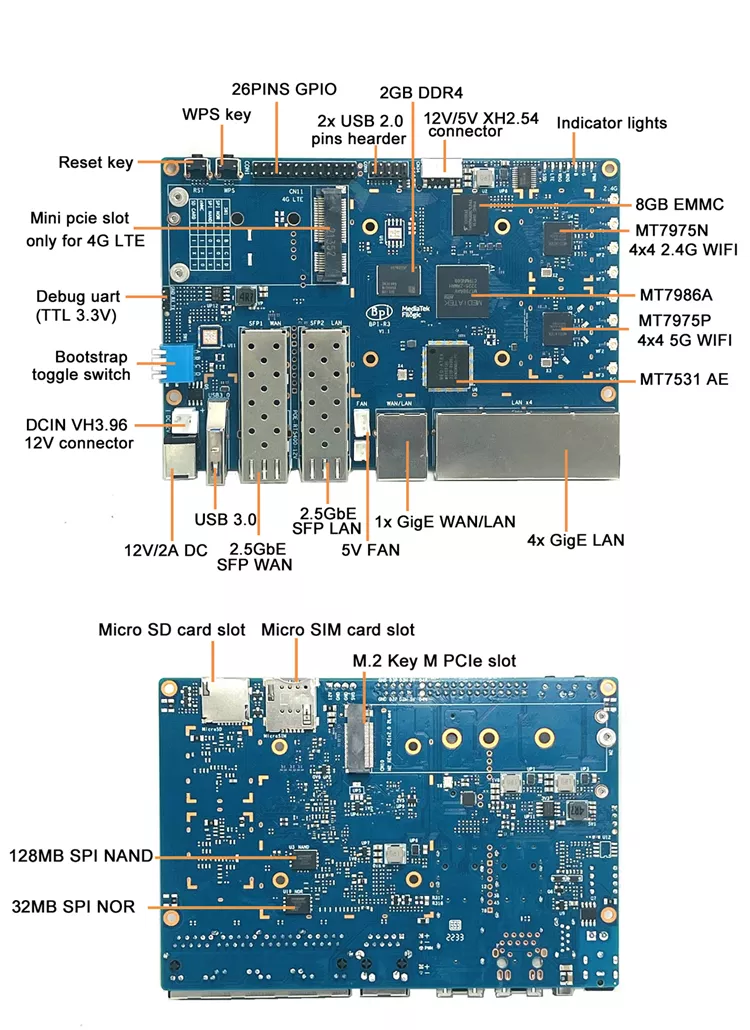
¶ First Boot
First I had to figure out what kind of power supply to use. It needs to be able to deliver up to ** 2 Ampere** at 12 Volts. Luckily I have plenty of power supplies in my lab so it's literally Plug & Play. The red Power LED lights up when you connect the power supply. There is a series of 7 LEDs, labeled like that:
- PWR
- G
- B
- W2G
- W5G
- LTE
- SSD
I could not find any specifics about each of those LED. Some of them are self explanatory but I couldn't figure out what the G and B LED are for.
This is what appears on the serial console if there is no bootable device.
F0: 102B 0000
FA: 1040 0000
FA: 1040 0000 [0200]
F9: 103F 0000
F3: 1001 0000 [0200]
F3: 1001 0000
F6: 300C 0028
F5: 480A 0031
00: 1005 0000
FA: 1040 0000
FA: 1040 0000 [0200]
F9: 103F 0000
F3: 1001 0000 [0200]
F3: 1001 0000
F6: 300C 0028
01: 102A 0001
02: 1005 0000
BP: 2000 00C0 [0001]
EC: 0000 0000 [3000]
T0: 0000 010F [010F]
System halt!
In order to see any output at all, I connected my USB to serial adapter directly to the UART 3 Pin serial port on the board.
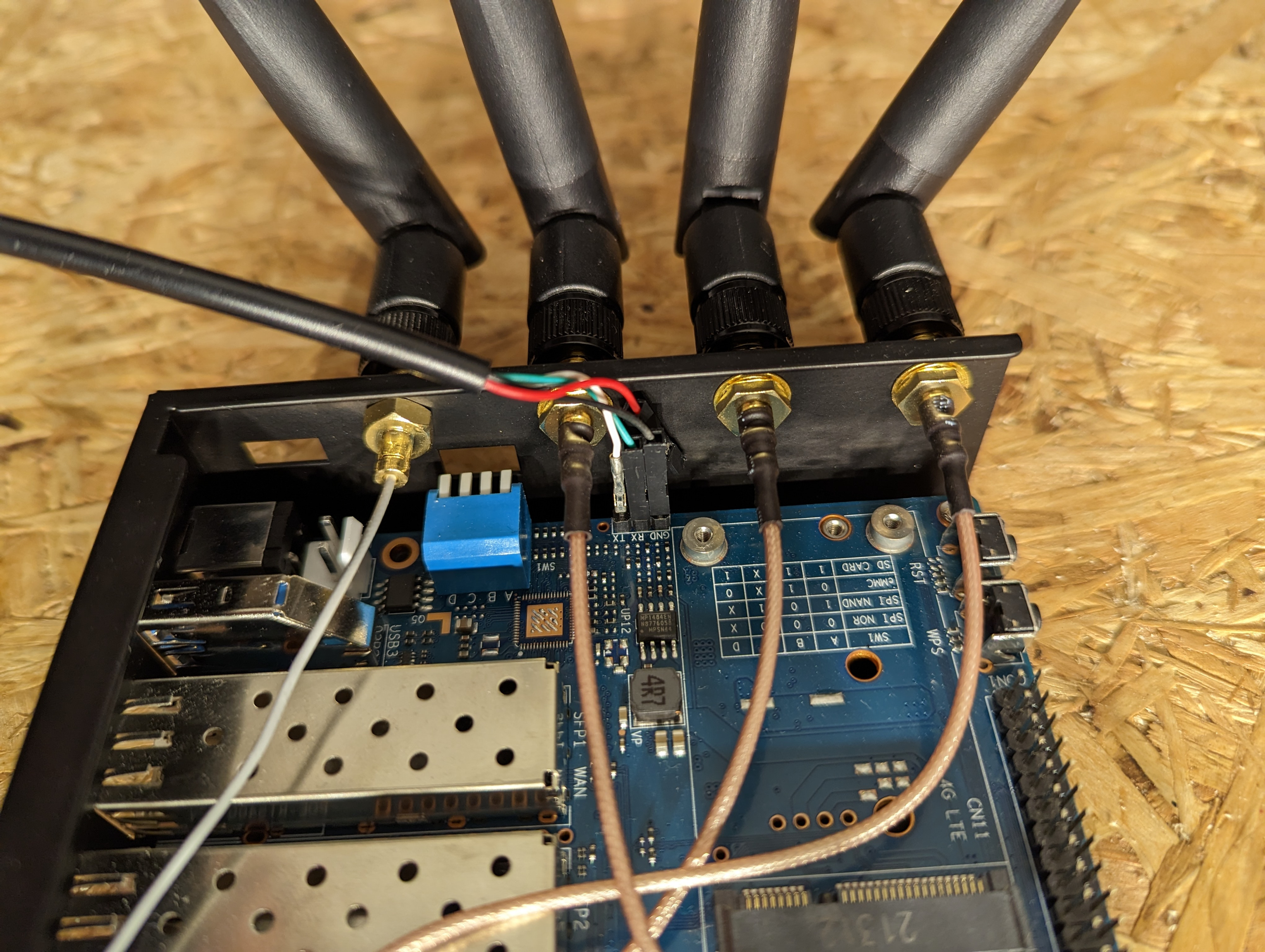
¶ Specification
The Banana BPI-R3 is an outstanding device when it comes to the technical specification. On different levels it offers features often lacking in other devices. Here is a short list of the highlights.
- SoC Mediatek MT7986/Filogic 830 ARM Cortex-A53 with 4 cores and a clock of 2 GHz
- Dual SFP 2.5G Ports
- a mini PCI Express slot (via USB) for LTE Modem 4G
- an onboard Micro SIM slot for the optional LTE Modem
- A builtin 8 GB eMMC Flash storage
- Builtin Wifi6 Support via
- MT7975N for 2.4 GHz, with 4 Wifi IPX Ports
- MT7975P for 5 GHz, with 4 Wifi IPX Ports
- 8 Antenna Ports in total
- 2 GB RAM DDR
- 1 USB 3.0 Port
- micro SD Card Slot
- M.2 NVME SSD Port with PCIe Gen2 x2
- Onboard 128MB SPI NAND storage
- Onboard 32MB SPI NOR storage
- GPIO Pins (26)
- 2 x USB2 onboard header
- 1 x 1G Ethernet WAN Port
- Integrated Mediatek MT7531 Switch
- 4 x 1G Ethernet LAN Ports
- Reset button
- WPS button
¶ 2.5G Networking
I think a word needs to be said to 2.5G networking these days. It seems like a valid options, since 5G and 10G Equipment is still a bit expensive and power hungry. Yet 2.5G is not that common. Try to find a 2.5G compatible SFP for fiber (LR / SR). They are pretty rare. One I could find was the TP-Link TL-SM411LSA (Fiber) which is sadly not available in Europe as the TL-SM410U (Copper) from TP-Link. Both adapters were tested by the manufacturer.
I tried a module that seemed like a good fit, but it's actually not: Mikrotik S+RJ10 which supports rates of 1G / 2.5G and 10G but it was not recognized by the Banana Pi. Probably because it's an SFP+ while the Pi only uses SFP.
Mon Nov 21 19:54:42 2022 kern.info kernel: [ 48.606834] sfp sfp2: module MikroTik S+RJ10 rev 2.16 sn F06003AE68AB dc 220214
Mon Nov 21 19:54:42 2022 kern.warn kernel: [ 48.616225] sfp sfp2: Host does not support 1.5W modules, module left in power mode 1
Mon Nov 21 19:54:42 2022 kern.err kernel: [ 48.624053] mt7530 mdio-bus:1f sfp2: vali[ 48.665987] hwmon hwmon3: temp1_input not attached to any thermal zone
dation of inband/10gbase-r with support 0000000,00000400,000060c0 failed: -22
Mon Nov 21 19:54:42 2022 kern.info kernel: [ 48.665987] hwmon hwmon3: temp1_input not attached to any thermal zone
The cheapest copper SFP for 2.5G Ethernet I could find was the SFP-2.5G-T from fs.com for around 50 €.
Also switches with 2.5G are not that common, yet. On the plus there is quite low power consumption and PCIe Ethernet Adapters with good chipsets like Intel are available from 30-40 € per piece.
2.5G Ethernet can be a reasonable decision to upgrade to. It's fast enough to cope with Wifi 6 simultaneous band speeds, it is affordable and consumes a reasonable amount of power. So if you choose 2.5G, the Banana Pi BPi-R3 might be a really good fit for you.
For my review though I was not able to get SFP modules that worked with the Banana Pi. At first I wanted to have fiber connection. Just for fun: Try to search a NIC that supports 2.5G Ethernet and offers SFP ports. Only those will be able to adapt to fiber connection. All adapters I could find were copper only. In the end I didn't manage to get 2.5G ethernet working, so all my wifi benchmarks are made with 1G only.
¶ Booting
The device comes preinstalled with OpenWrt 21.02-SNAPSHOT as well as on the NAND and the NOR chip. It's a bit difficult to figure out how to choose between boot devices. There is a 4 channel dip switch on the side of the device. The labelling is a bit confusing. On one side it's:
(1) (2) (3) (4)
on the other side there is:
(A) (B) (C) (D)
In the Wiki they use:
(SW1-A) (SW1-B) (SW1-C) (SW1-D)
I will use the notation below. This is how you choose what boot device you would like to use:
| Jumper Setting | (1) | (2) | (3) | (4) |
|---|---|---|---|---|
| SPIM-NOR | ||||
| SPIM-NAND | ||||
| eMMC | ||||
| SD |
-> pull the lever down
-> pull the lever up
-> irrelevant if up or down
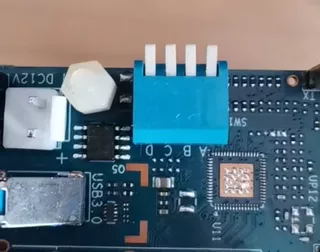
Sadly booting from M.2 NVME SSD is not possible, so this is only an option for additional mass storage.
¶ Install Vanilla OpenWrt
First things first, install OpenWrt. The latest stable release 22.03.2 does not support the device, yet, I need to download the snapshot image for sdcard. This is how to flash it to an micro SD card.
wget https://downloads.openwrt.org/snapshots/targets/mediatek/filogic/openwrt-mediatek-filogic-bananapi_bpi-r3-sdcard.img.gz
--2022-11-19 14:22:20-- https://downloads.openwrt.org/snapshots/targets/mediatek/filogic/openwrt-mediatek-filogic-bananapi_bpi-r3-sdcard.img.gz
Loaded CA certificate '/etc/ssl/certs/ca-certificates.crt'
Resolving downloads.openwrt.org (downloads.openwrt.org)... 2a01:4f8:251:321::2, 168.119.138.211
Connecting to downloads.openwrt.org (downloads.openwrt.org)|2a01:4f8:251:321::2|:443... connected.
HTTP request sent, awaiting response... 200 OK
Length: 21353937 (20M) [application/octet-stream]
Saving to: 'openwrt-mediatek-filogic-bananapi_bpi-r3-sdcard.img.gz'
openwrt-mediatek-filogic-bananapi_bpi-r3-sdcard 100%[=====================================================================================================>] 20,36M 2,63MB/s in 6,0s
2022-11-19 14:22:27 (3,39 MB/s) - 'openwrt-mediatek-filogic-bananapi_bpi-r3-sdcard.img.gz' saved [21353937/21353937]
sudo dd bs=4M if=openwrt-mediatek-filogic-bananapi_bpi-r3-sdcard.img of=/dev/sda
sudo sync
First try already worked. The full bootlog can be found at the appendix. SD card and the integrated EMMC cannot be used at the same time, as they share the same interface on the SoC.
As the snapshot images typically come without a webgui this is what I install first.
opkg install luci luci-ssl
This pre-release of vanilla OpenWrt I used for all my tests and benchmarks, it's OpenWrt SNAPSHOT, r21629-9d8eff6799
¶ Wireless
No additional packages were necessary to get Wifi support. The integrated MediaTek MT7986 supports both 5 and 2.5 GHz with support for Wifi 6 ( aka 802.11ax).
This is how the wifi status looks like:
root@OpenWrt:/etc/config# wifi status
{
"radio0": {
"up": false,
"pending": false,
"autostart": true,
"disabled": true,
"retry_setup_failed": false,
"config": {
"path": "platform/soc/18000000.wmac",
"channel": "1",
"band": "2g",
"htmode": "HE20",
"disabled": true
},
"interfaces": [
{
"section": "default_radio0",
"config": {
"mode": "ap",
"ssid": "OpenWrt",
"encryption": "none",
"network": [
"lan"
],
"mode": "ap"
},
"vlans": [
],
"stations": [
]
}
]
},
"radio1": {
"up": false,
"pending": false,
"autostart": true,
"disabled": true,
"retry_setup_failed": false,
"config": {
"path": "platform/soc/18000000.wmac+1",
"channel": "36",
"band": "5g",
"htmode": "HE80",
"disabled": true
},
"interfaces": [
{
"section": "default_radio1",
"config": {
"mode": "ap",
"ssid": "OpenWrt",
"encryption": "none",
"network": [
"lan"
],
"mode": "ap"
},
"vlans": [
],
"stations": [
]
}
]
}
}
The Board comes with eight IPX Antenna connectors, four times 2.4 GHz and four times 5 GHz.
As this documentation shows, the integrated Wifi Chips support 4x4 Mimo for both 2.4 and 5 GHz. In the spec sheet from Mediatek it says:
Support Dual band Dual Concurrent
During my tests I was not able to get concurrent dual band working,
In order to get some numbers I installed and started iperf3 on the rpi3 itself and tested with a Lenovo T14 Gen1 AMD and an Intel Corporation Wi-Fi 6 AX200 (rev 1a).
This is the OpenWrt wifi configuration for my benchmarks:
config wifi-device 'radio0'
option type 'mac80211'
option path 'platform/soc/18000000.wmac'
option band '2g'
option cell_density '0'
option htmode 'HE40'
option channel '9'
option txpower '20'
config wifi-iface 'default_radio0'
option device 'radio0'
option network 'lan'
option mode 'ap'
option ssid 'bench'
option encryption 'sae'
option key 'temppw'
config wifi-device 'radio1'
option type 'mac80211'
option path 'platform/soc/18000000.wmac+1'
option band '5g'
option cell_density '0'
option htmode 'HE80'
option txpower '20'
option channel 'auto'
config wifi-iface 'default_radio1'
option device 'radio1'
option network 'lan'
option mode 'ap'
option ssid 'bench'
option encryption 'sae'
option key 'temppw'
In order to get the highest rates possible I enabled 40 MHz bandwidth for 2.5GHz and 80 MHz width for the 5 GHz band. Choosing 160Mhz did not work.
Those are the results:
iperf3 -c 192.168.1.1 ✔ 10s
Connecting to host 192.168.1.1, port 5201
[ 5] local 192.168.1.191 port 32960 connected to 192.168.1.1 port 5201
[ ID] Interval Transfer Bitrate Retr Cwnd
[ 5] 0.00-1.00 sec 95.6 MBytes 802 Mbits/sec 0 2.78 MBytes
[ 5] 1.00-2.00 sec 109 MBytes 913 Mbits/sec 0 3.03 MBytes
[ 5] 2.00-3.00 sec 108 MBytes 902 Mbits/sec 0 3.03 MBytes
[ 5] 3.00-4.00 sec 76.2 MBytes 640 Mbits/sec 0 3.03 MBytes
[ 5] 4.00-5.00 sec 40.0 MBytes 336 Mbits/sec 1 3.03 MBytes
[ 5] 5.00-6.00 sec 85.0 MBytes 713 Mbits/sec 0 3.03 MBytes
[ 5] 6.00-7.00 sec 106 MBytes 891 Mbits/sec 0 3.03 MBytes
[ 5] 7.00-8.00 sec 106 MBytes 891 Mbits/sec 0 3.03 MBytes
[ 5] 8.00-9.00 sec 108 MBytes 902 Mbits/sec 0 3.03 MBytes
[ 5] 9.00-10.00 sec 102 MBytes 860 Mbits/sec 0 3.03 MBytes
- - - - - - - - - - - - - - - - - - - - - - - - -
[ ID] Interval Transfer Bitrate Retr
[ 5] 0.00-10.00 sec 936 MBytes 785 Mbits/sec 1 sender
[ 5] 0.00-10.01 sec 934 MBytes 783 Mbits/sec receiver
iperf Done.
I was not able to utilize 2.4 GHz and 5 GHz band at the same time. So if this is going to work some day you can expect to break through the one gigabit/s threshold. You can say that the wireless results are ok for single band only. It peaked at around 900 Mbit/s but overall it was around 600 Mbit/s on average.
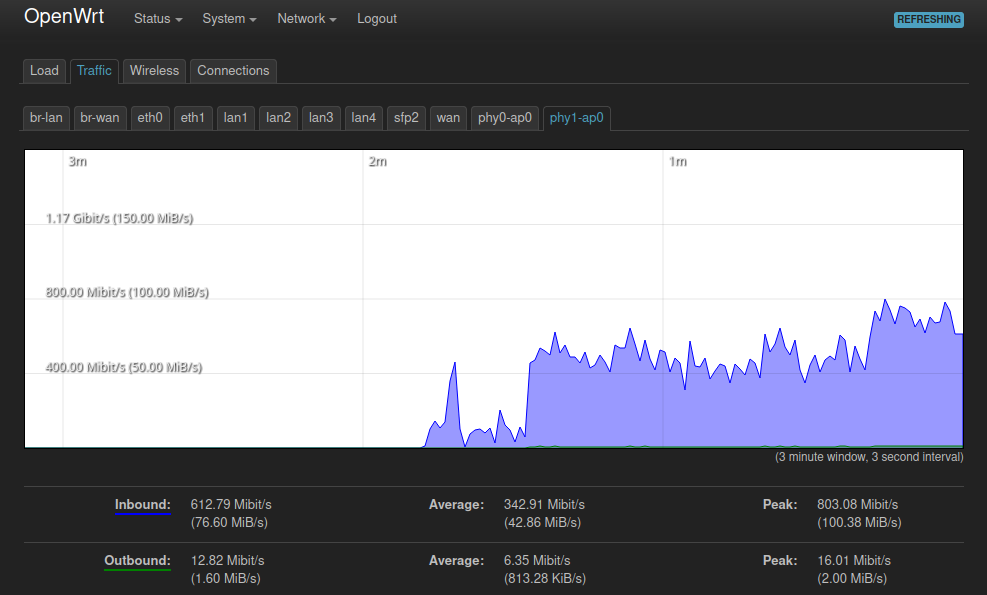
This is a traffic graph of the 5GHz interface during an iperf3 test.
¶ CPU Benchmarks
In order to get some numbers about how much performance you can expect from the CPU I did some OpenSSL Benchmarks. Please refer to this site for more information about the how the test is performed. You can see a comparison to more different systems on this page. I benchmarked three different devices:
- Deciso DEC740
- PC Engines APU4D4
- Banana Pi Bpi-r3
¶ Hashes
Values in MB/s (1 MB = 1,000,000 Bytes)
Higher is better
| Device | MD5 | SHA-1 | SHA-256 | SHA-512 |
|---|---|---|---|---|
| Bpi-r3 | 208,86221 | 760,25424 | 733,88059 | 176,53555 |
| dec740 | 403,88574 | 1041,77118 | 976,66389 | 333,8281 |
| apu4d4 | 176,59563 | 109,61047 | 51,58117 | 60,28654 |
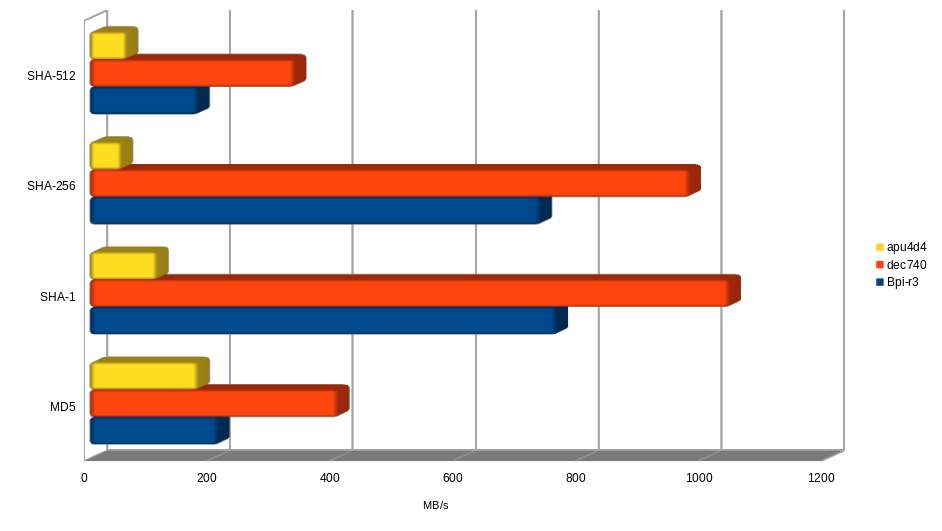
¶ Cryptos
Values in MB/s (1 MB = 1,000,000 Bytes)
Higher is better
| Device | DES | 3DES | AES-128 | AES-192 | AES-256 |
|---|---|---|---|---|---|
| Bpi-r3 | 24,30031 | 8,42934 | 57,23338 | 50,99657 | 45,17342 |
| dec740 | 49,22709 | 17,73636 | 151,5578 | 130,53065 | 114,74193 |
| apu4d4 | 15,70167 | 5,97129 | 36,04992 | 30,94528 | 27,28448 |
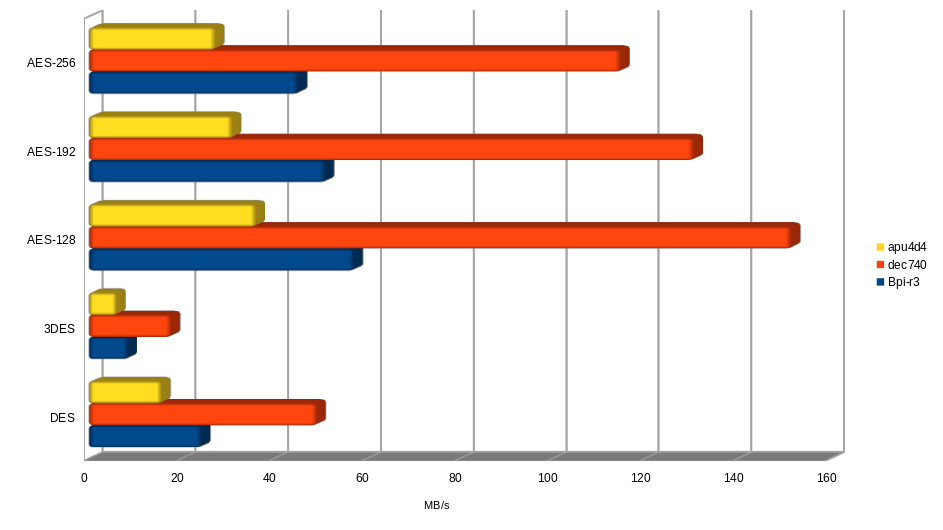
¶ RSA/DSA Sign Verify
Duration in milliseconds
Lower is better
| Device | RSA Sign | RSA Verify | DSA Sign | DSA Verify |
|---|---|---|---|---|
| Bpi-r3 | 5,458 | 0,150 | 2,003 | 1,863 |
| dec740 | 1,276 | 0,039 | 0,536 | 0,508 |
| apu4d4 | 7,665 | 0,223 | 3,004 | 2,763 |
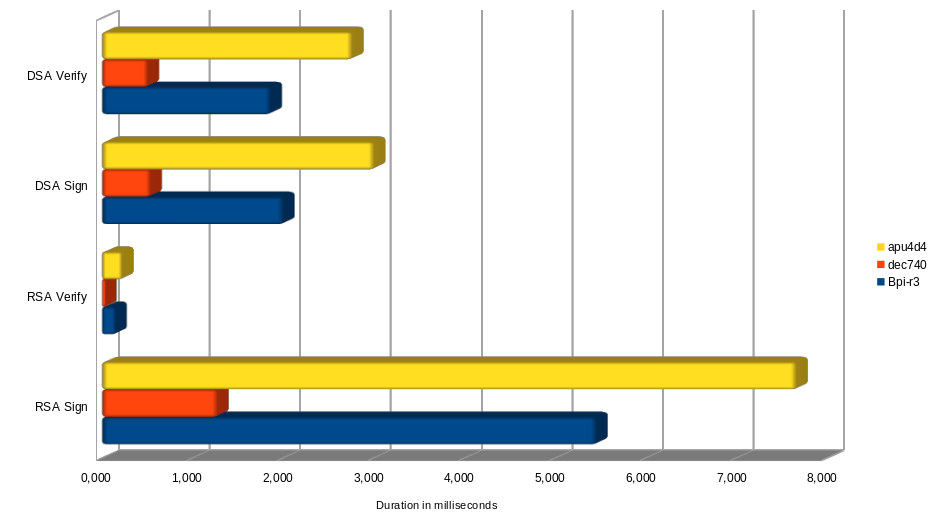
Signatures / Verifications per second
Higher is better
| Device | RSA Sign | RSA Verify | DSA Sign | DSA Verify |
|---|---|---|---|---|
| Bpi-r3 | 183,2 | 6683,3 | 499,2 | 536,7 |
| dec740 | 783,8 | 25588,8 | 1866 | 1969,6 |
| apu4d4 | 130,5 | 4489,2 | 332,9 | 362 |
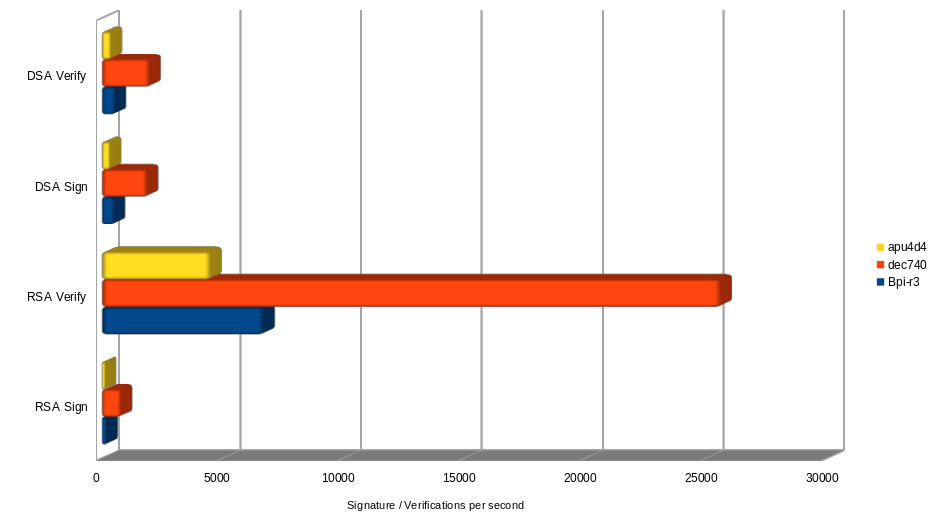
As expected the AMD Ambedded CPU of the dec740 outperforms in all benchmarks. The Banana Pi is faster than the AMD CPU of the APU4 in every test, too. Overwall I would say a very decent performance for such a low power SoC.
¶ Power consumption:
| Range of power consumption in Watt | Number of Twisted Pair connected | Number of SFP connteced | Wifi 2.5GHz enabled | Wifi 5GHz enabled | CPU state | M2 SSD | mini-PCI express |
|---|---|---|---|---|---|---|---|
| 4.1 - 4.2 | 1 | 0 | idle | ||||
| 4.8 - 4.9 | 1 | 0 | idle | ||||
| 5.1 | 1 | 0 | idle | ||||
| 5.1 - 5.2 | 1 | 0 | CPU Benchmark OpenSSL | ||||
| 5,9 - 6 | 1 | 0 | 10-20% usage | ||||
| 8.1 | 1 | 0 | idle | ||||
| 8.3 - 8.4 | 1 | 0 | CPU Benchmark OpenSSL |
As a result I would say running idle versus running CPU intensive tasks the difference is around 0.3 Watt. The biggest difference so far is in using an NVME SSD. It adds a bit more than 3 Watts to the bill. Enabling Wifi will add around 0.6 Watts. When under full load and fully equiped with M.2 and mini PCIe it might go a bit over 10 Watts which is really a formidable value.
¶ Final words
If you plan on getting this device I suggest you get it together with a case, wifi antenna cables and antennas of course. The most logical move would be to take a such a kit.
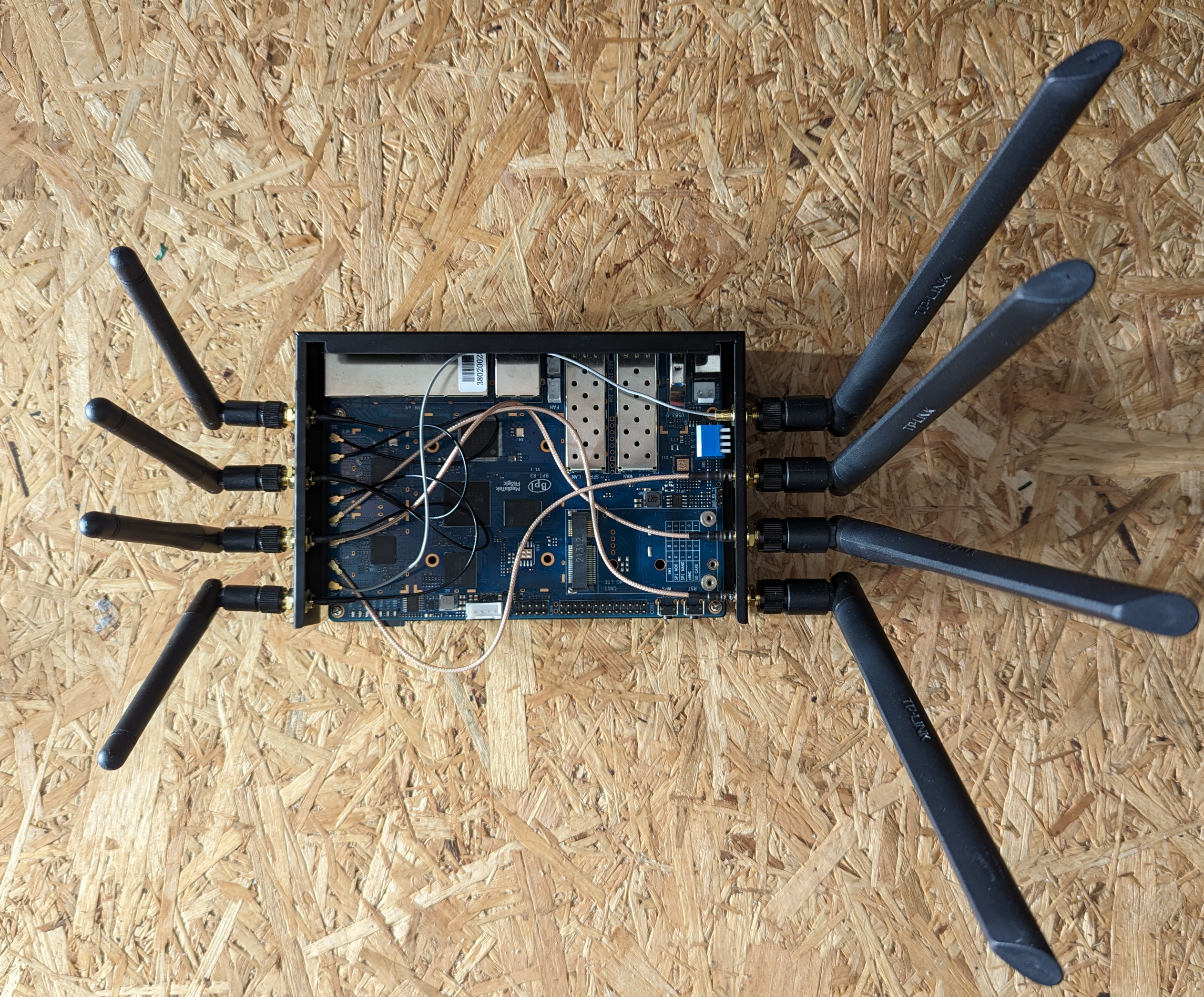
If you plan to go from 1G to 2.5G ethernet it's also quite of an ideal candidate, considering the really good price performance ratio. The current unstable branch of OpenWrt is already really usable but you can of course use the manufacturer's image, which is a reasonably recent version of OpenWrt.
The Banana Pi r3 is a good performer and at the same time consumes only little power.
¶ Appendix
Full Bootlog:
[ 0.000000] Booting Linux on physical CPU 0x0000000000 [0x410fd034]
[ 0.000000] Linux version 5.15.79 (builder@buildhost) (aarch64-openwrt-linux-musl-gcc (OpenWrt GCC 11.3.0 r21314-1996d600bd) 11.3.0, GNU ld (GNU Binutils) 2.37) #0 SMP Thu Nov 17 15:43:55 2022
[ 0.000000] Machine model: Bananapi BPI-R3
[ 0.000000] Zone ranges:
[ 0.000000] DMA [mem 0x0000000040000000-0x00000000bfffffff]
[ 0.000000] DMA32 empty
[ 0.000000] Normal empty
[ 0.000000] Movable zone start for each node
[ 0.000000] Early memory node ranges
[ 0.000000] node 0: [mem 0x0000000040000000-0x0000000042ffffff]
[ 0.000000] node 0: [mem 0x0000000043000000-0x000000004302ffff]
[ 0.000000] node 0: [mem 0x0000000043030000-0x000000004fbfffff]
[ 0.000000] node 0: [mem 0x000000004fc00000-0x000000004fcfffff]
[ 0.000000] node 0: [mem 0x000000004fd00000-0x00000000bfffffff]
[ 0.000000] Initmem setup node 0 [mem 0x0000000040000000-0x00000000bfffffff]
[ 0.000000] psci: probing for conduit method from DT.
[ 0.000000] psci: PSCIv1.1 detected in firmware.
[ 0.000000] psci: Using standard PSCI v0.2 function IDs
[ 0.000000] psci: MIGRATE_INFO_TYPE not supported.
[ 0.000000] psci: SMC Calling Convention v1.2
[ 0.000000] percpu: Embedded 17 pages/cpu s30040 r8192 d31400 u69632
[ 0.000000] pcpu-alloc: s30040 r8192 d31400 u69632 alloc=17*4096
[ 0.000000] pcpu-alloc: [0] 0 [0] 1 [0] 2 [0] 3
[ 0.000000] Detected VIPT I-cache on CPU0
[ 0.000000] CPU features: detected: GIC system register CPU interface
[ 0.000000] CPU features: kernel page table isolation disabled by kernel configuration
[ 0.000000] Built 1 zonelists, mobility grouping on. Total pages: 516096
[ 0.000000] Kernel command line: root=/dev/mmcblk0p65
[ 0.000000] Dentry cache hash table entries: 262144 (order: 9, 2097152 bytes, linear)
[ 0.000000] Inode-cache hash table entries: 131072 (order: 8, 1048576 bytes, linear)
[ 0.000000] mem auto-init: stack:off, heap alloc:off, heap free:off
[ 0.000000] Memory: 2043268K/2097152K available (8320K kernel code, 898K rwdata, 2176K rodata, 384K init, 300K bss, 53884K reserved, 0K cma-reserved)
[ 0.000000] SLUB: HWalign=64, Order=0-3, MinObjects=0, CPUs=4, Nodes=1
[ 0.000000] rcu: Hierarchical RCU implementation.
[ 0.000000] Tracing variant of Tasks RCU enabled.
[ 0.000000] rcu: RCU calculated value of scheduler-enlistment delay is 10 jiffies.
[ 0.000000] NR_IRQS: 64, nr_irqs: 64, preallocated irqs: 0
[ 0.000000] GICv3: GIC: Using split EOI/Deactivate mode
[ 0.000000] GICv3: 640 SPIs implemented
[ 0.000000] GICv3: 0 Extended SPIs implemented
[ 0.000000] GICv3: Distributor has no Range Selector support
[ 0.000000] Root IRQ handler: gic_handle_irq
[ 0.000000] GICv3: 16 PPIs implemented
[ 0.000000] GICv3: CPU0: found redistributor 0 region 0:0x000000000c080000
[ 0.000000] arch_timer: cp15 timer(s) running at 13.00MHz (phys).
[ 0.000000] clocksource: arch_sys_counter: mask: 0xffffffffffffff max_cycles: 0x2ff89eacb, max_idle_ns: 440795202429 ns
[ 0.000000] sched_clock: 56 bits at 13MHz, resolution 76ns, wraps every 4398046511101ns
[ 0.000138] Calibrating delay loop (skipped), value calculated using timer frequency.. 26.00 BogoMIPS (lpj=130000)
[ 0.000146] pid_max: default: 32768 minimum: 301
[ 0.000230] Mount-cache hash table entries: 4096 (order: 3, 32768 bytes, linear)
[ 0.000243] Mountpoint-cache hash table entries: 4096 (order: 3, 32768 bytes, linear)
[ 0.001126] rcu: Hierarchical SRCU implementation.
[ 0.001213] dyndbg: Ignore empty _ddebug table in a CONFIG_DYNAMIC_DEBUG_CORE build
[ 0.001412] smp: Bringing up secondary CPUs ...
[ 0.001643] Detected VIPT I-cache on CPU1
[ 0.001664] GICv3: CPU1: found redistributor 1 region 0:0x000000000c0a0000
[ 0.001690] CPU1: Booted secondary processor 0x0000000001 [0x410fd034]
[ 0.001952] Detected VIPT I-cache on CPU2
[ 0.001964] GICv3: CPU2: found redistributor 2 region 0:0x000000000c0c0000
[ 0.001975] CPU2: Booted secondary processor 0x0000000002 [0x410fd034]
[ 0.002196] Detected VIPT I-cache on CPU3
[ 0.002206] GICv3: CPU3: found redistributor 3 region 0:0x000000000c0e0000
[ 0.002216] CPU3: Booted secondary processor 0x0000000003 [0x410fd034]
[ 0.002243] smp: Brought up 1 node, 4 CPUs
[ 0.002257] SMP: Total of 4 processors activated.
[ 0.002260] CPU features: detected: 32-bit EL0 Support
[ 0.002263] CPU features: detected: CRC32 instructions
[ 0.002338] CPU: All CPU(s) started at EL2
[ 0.002349] alternatives: patching kernel code
[ 0.004700] clocksource: jiffies: mask: 0xffffffff max_cycles: 0xffffffff, max_idle_ns: 19112604462750000 ns
[ 0.004722] futex hash table entries: 1024 (order: 4, 65536 bytes, linear)
[ 0.004832] pinctrl core: initialized pinctrl subsystem
[ 0.005399] NET: Registered PF_NETLINK/PF_ROUTE protocol family
[ 0.005614] DMA: preallocated 256 KiB GFP_KERNEL pool for atomic allocations
[ 0.005646] DMA: preallocated 256 KiB GFP_KERNEL|GFP_DMA pool for atomic allocations
[ 0.005672] DMA: preallocated 256 KiB GFP_KERNEL|GFP_DMA32 pool for atomic allocations
[ 0.005896] thermal_sys: Registered thermal governor 'fair_share'
[ 0.005899] thermal_sys: Registered thermal governor 'bang_bang'
[ 0.005902] thermal_sys: Registered thermal governor 'step_wise'
[ 0.005906] thermal_sys: Registered thermal governor 'user_space'
[ 0.006085] ASID allocator initialised with 65536 entries
[ 0.006331] pstore: Registered ramoops as persistent store backend
[ 0.006335] ramoops: using 0x10000@0x42ff0000, ecc: 0
[ 0.014746] cryptd: max_cpu_qlen set to 1000
[ 0.016446] SCSI subsystem initialized
[ 0.016528] libata version 3.00 loaded.
[ 0.017276] clocksource: Switched to clocksource arch_sys_counter
[ 0.017683] NET: Registered PF_INET protocol family
[ 0.017798] IP idents hash table entries: 32768 (order: 6, 262144 bytes, linear)
[ 0.018377] tcp_listen_portaddr_hash hash table entries: 1024 (order: 2, 16384 bytes, linear)
[ 0.018396] Table-perturb hash table entries: 65536 (order: 6, 262144 bytes, linear)
[ 0.018404] TCP established hash table entries: 16384 (order: 5, 131072 bytes, linear)
[ 0.018470] TCP bind hash table entries: 16384 (order: 6, 262144 bytes, linear)
[ 0.018642] TCP: Hash tables configured (established 16384 bind 16384)
[ 0.018716] UDP hash table entries: 1024 (order: 3, 32768 bytes, linear)
[ 0.018743] UDP-Lite hash table entries: 1024 (order: 3, 32768 bytes, linear)
[ 0.018842] NET: Registered PF_UNIX/PF_LOCAL protocol family
[ 0.018861] PCI: CLS 0 bytes, default 64
[ 0.020644] workingset: timestamp_bits=46 max_order=19 bucket_order=0
[ 0.022650] squashfs: version 4.0 (2009/01/31) Phillip Lougher
[ 0.022663] jffs2: version 2.2 (NAND) (SUMMARY) (LZMA) (RTIME) (CMODE_PRIORITY) (c) 2001-2006 Red Hat, Inc.
[ 0.044579] Block layer SCSI generic (bsg) driver version 0.4 loaded (major 251)
[ 0.045621] pwm-mediatek 10048000.pwm: clock: top fail: -517
[ 0.045893] mtk-pcie-gen3 11280000.pcie: host bridge /soc/pcie@11280000 ranges:
[ 0.045915] mtk-pcie-gen3 11280000.pcie: Parsing ranges property...
[ 0.045924] mtk-pcie-gen3 11280000.pcie: MEM 0x0020000000..0x002fffffff -> 0x0020000000
[ 0.045971] phy phy-soc:t-phy@11c00000.0: u3 auto load valid efuse: ENABLE with value: 1
[ 0.045999] phy phy-soc:t-phy@11c00000.0: pcie auto load valid efuse: ENABLE with value: 1
[ 0.046020] phy phy-soc:t-phy@11c00000.0: u3 lane1 efuse - intr 23, rx_imp e, tx_imp c
[ 0.046074] /soc/pcie@11280000: Failed to get clk index: 0 ret: -517
[ 0.046085] mtk-pcie-gen3 11280000.pcie: failed to get clocks
[ 0.048271] Serial: 8250/16550 driver, 16 ports, IRQ sharing enabled
[ 0.049814] printk: console [ttyS0] disabled
[ 0.069960] 11002000.serial: ttyS0 at MMIO 0x11002000 (irq = 122, base_baud = 2500000) is a ST16650V2
[ 0.773612] printk: console [ttyS0] enabled
[ 0.798378] 11003000.serial: ttyS1 at MMIO 0x11003000 (irq = 123, base_baud = 1625000) is a ST16650V2
[ 0.808196] mtk_rng 1020f000.trng: registered RNG driver
[ 0.808256] hwrng: no data available
[ 0.817076] cacheinfo: Unable to detect cache hierarchy for CPU 0
[ 0.825039] loop: module loaded
[ 0.828232] Loading iSCSI transport class v2.0-870.
[ 0.834418] spi-nand spi0.0: Winbond SPI NAND was found.
[ 0.839740] spi-nand spi0.0: 128 MiB, block size: 128 KiB, page size: 2048, OOB size: 64
[ 0.847977] 4 fixed-partitions partitions found on MTD device spi0.0
[ 0.854314] Creating 4 MTD partitions on "spi0.0":
[ 0.859095] 0x000000580000-0x000008000000 : "ubi"
[ 0.994880] 0x000000380000-0x000000580000 : "fip"
[ 1.001962] 0x000000080000-0x000000380000 : "reserved"
[ 1.010512] 0x000000000000-0x000000080000 : "bl2"
[ 1.031903] mtk_soc_eth 15100000.ethernet eth0: mediatek frame engine at 0xffffffc009780000, irq 132
[ 1.041678] mtk_soc_eth 15100000.ethernet eth1: mediatek frame engine at 0xffffffc009780000, irq 132
[ 1.051200] i2c_dev: i2c /dev entries driver
[ 1.056803] mtk-wdt 1001c000.watchdog: Watchdog enabled (timeout=31 sec, nowayout=0)
[ 1.065207] NET: Registered PF_INET6 protocol family
[ 1.070794] Segment Routing with IPv6
[ 1.074466] In-situ OAM (IOAM) with IPv6
[ 1.078429] NET: Registered PF_PACKET protocol family
[ 1.083494] bridge: filtering via arp/ip/ip6tables is no longer available by default. Update your scripts to load br_netfilter if you need this.
[ 1.096492] 8021q: 802.1Q VLAN Support v1.8
[ 1.101515] pstore: Using crash dump compression: deflate
[ 1.111960] mtk-pcie-gen3 11280000.pcie: host bridge /soc/pcie@11280000 ranges:
[ 1.119311] mtk-pcie-gen3 11280000.pcie: Parsing ranges property...
[ 1.125563] mtk-pcie-gen3 11280000.pcie: MEM 0x0020000000..0x002fffffff -> 0x0020000000
[ 1.134030] phy phy-soc:t-phy@11c00000.0: u3 auto load valid efuse: ENABLE with value: 1
[ 1.142126] phy phy-soc:t-phy@11c00000.0: pcie auto load valid efuse: ENABLE with value: 1
[ 1.150388] phy phy-soc:t-phy@11c00000.0: u3 lane1 efuse - intr 23, rx_imp e, tx_imp c
[ 1.165283] mmc0: host does not support reading read-only switch, assuming write-enable
[ 1.175110] mmc0: new high speed SDHC card at address 0001
[ 1.181377] mmcblk0: mmc0:0001 00000 29.8 GiB
[ 1.189395] Alternate GPT is invalid, using primary GPT.
[ 1.195355] FIT: Selected configuration: "config-mt7986a-bananapi-bpi-r3-snand" (OpenWrt bananapi_bpi-r3 with mt7986a-bananapi-bpi-r3-snand)
[ 1.207945] FIT: kernel sub-image 0x00001000..0x00519475 "kernel-1" (ARM64 OpenWrt Linux-5.15.79)
[ 1.217759] FIT: flat_dt sub-image 0x0051a000..0x00521fff "fdt-1" (ARM64 OpenWrt bananapi_bpi-r3 device tree blob)
[ 1.228960] FIT: flat_dt sub-image 0x00522000..0x00529fff "fdt-mt7986a-bananapi-bpi-r3-nor" (ARM64 OpenWrt bananapi_bpi-r3 device tree overlay mt7986a-bananapi-bpi-r3-nor)
[ 1.245102] FIT: flat_dt sub-image 0x0052a000..0x00531fff "fdt-mt7986a-bananapi-bpi-r3-emmc-nor" (ARM64 OpenWrt bananapi_bpi-r3 device tree overlay mt7986a-bananapi-bpi-r3-emmc-nor)
[ 1.262113] FIT: flat_dt sub-image 0x00532000..0x00539fff "fdt-mt7986a-bananapi-bpi-r3-emmc-snand" (ARM64 OpenWrt bananapi_bpi-r3 device tree overlay mt7986a-bananapi-bpi-r3-emmc-snand)
[ 1.279475] FIT: flat_dt sub-image 0x0053a000..0x00541fff "fdt-mt7986a-bananapi-bpi-r3-snand" (ARM64 OpenWrt bananapi_bpi-r3 device tree overlay mt7986a-bananapi-bpi-r3-snand)
[ 1.295958] FIT: filesystem sub-image 0x00542000..0x00a89fff "rootfs-1" (ARM64 OpenWrt bananapi_bpi-r3 rootfs)
[ 1.306546] FIT: selecting configured loadable "rootfs-1" to be root filesystem
[ 1.313842] mmcblk0: p1 p2 p3 p4 p5 p6 p7 p65(rootfs-1) p66(rootfs_data)
[ 1.379480] mtk-pcie-gen3 11280000.pcie: PCIe link down, ltssm reg val: 0x1000001
[ 1.386980] mtk-pcie-gen3: probe of 11280000.pcie failed with error -110
[ 1.416093] mt7530 mdio-bus:1f: configuring for fixed/2500base-x link mode
[ 1.423249] mt7530 mdio-bus:1f: Link is Up - 2.5Gbps/Full - flow control rx/tx
[ 1.432190] mt7530 mdio-bus:1f wan (uninitialized): PHY [mt7530-0:00] driver [MediaTek MT7531 PHY] (irq=140)
[ 1.451945] mt7530 mdio-bus:1f lan1 (uninitialized): PHY [mt7530-0:01] driver [MediaTek MT7531 PHY] (irq=141)
[ 1.471507] mt7530 mdio-bus:1f lan2 (uninitialized): PHY [mt7530-0:02] driver [MediaTek MT7531 PHY] (irq=142)
[ 1.491055] mt7530 mdio-bus:1f lan3 (uninitialized): PHY [mt7530-0:03] driver [MediaTek MT7531 PHY] (irq=143)
[ 1.510600] mt7530 mdio-bus:1f lan4 (uninitialized): PHY [mt7530-0:04] driver [MediaTek MT7531 PHY] (irq=144)
[ 1.521216] DSA: tree 0 setup
[ 1.526356] UBI: auto-attach mtd0
[ 1.529766] ubi0: default fastmap pool size: 45
[ 1.534280] ubi0: default fastmap WL pool size: 22
[ 1.539057] ubi0: attaching mtd0
[ 5.120136] ubi0: scanning is finished
[ 5.164970] ubi0: attached mtd0 (name "ubi", size 122 MiB)
[ 5.170462] ubi0: PEB size: 131072 bytes (128 KiB), LEB size: 126976 bytes
[ 5.177319] ubi0: min./max. I/O unit sizes: 2048/2048, sub-page size 2048
[ 5.184084] ubi0: VID header offset: 2048 (aligned 2048), data offset: 4096
[ 5.191028] ubi0: good PEBs: 980, bad PEBs: 0, corrupted PEBs: 0
[ 5.197013] ubi0: user volume: 3, internal volumes: 1, max. volumes count: 128
[ 5.204214] ubi0: max/mean erase counter: 2/0, WL threshold: 4096, image sequence number: 1642748947
[ 5.213324] ubi0: available PEBs: 465, total reserved PEBs: 515, PEBs reserved for bad PEB handling: 20
[ 5.222698] ubi0: background thread "ubi_bgt0d" started, PID 516
[ 5.228751] block ubiblock0_1: created from ubi0:1(rootfs)
[ 5.243580] VFS: Mounted root (squashfs filesystem) readonly on device 259:0.
[ 5.250864] Freeing unused kernel memory: 384K
[ 5.297371] Run /sbin/init as init process
[ 5.301451] with arguments:
[ 5.304402] /sbin/init
[ 5.307092] with environment:
[ 5.310221] HOME=/
[ 5.312566] TERM=linux
[ 5.437782] init: Console is alive
[ 5.441274] init: - watchdog -
[ 5.747136] kmodloader: loading kernel modules from /etc/modules-boot.d/*
[ 5.786367] usbcore: registered new interface driver usbfs
[ 5.791895] usbcore: registered new interface driver hub
[ 5.797221] usbcore: registered new device driver usb
[ 5.805920] phy phy-soc:t-phy@11e10000.1: u2 auto load valid efuse: ENABLE with value: 1
[ 5.814081] phy phy-soc:t-phy@11e10000.2: u3 auto load valid efuse: ENABLE with value: 1
[ 5.822219] phy phy-soc:t-phy@11e10000.3: u2 auto load valid efuse: ENABLE with value: 1
[ 5.830754] xhci-mtk 11200000.usb: xHCI Host Controller
[ 5.835975] xhci-mtk 11200000.usb: new USB bus registered, assigned bus number 1
[ 5.846441] xhci-mtk 11200000.usb: hcc params 0x01403f99 hci version 0x110 quirks 0x0000000000210010
[ 5.855620] xhci-mtk 11200000.usb: irq 126, io mem 0x11200000
[ 5.861440] xhci-mtk 11200000.usb: xHCI Host Controller
[ 5.866650] xhci-mtk 11200000.usb: new USB bus registered, assigned bus number 2
[ 5.874030] xhci-mtk 11200000.usb: Host supports USB 3.2 Enhanced SuperSpeed
[ 5.881382] hub 1-0:1.0: USB hub found
[ 5.885134] hub 1-0:1.0: 2 ports detected
[ 5.889416] usb usb2: We don't know the algorithms for LPM for this host, disabling LPM.
[ 5.897731] hub 2-0:1.0: USB hub found
[ 5.901481] hub 2-0:1.0: 1 port detected
[ 5.907906] kmodloader: done loading kernel modules from /etc/modules-boot.d/*
[ 5.924016] init: - preinit -
[ 6.092133] mtk_soc_eth 15100000.ethernet eth0: configuring for fixed/2500base-x link mode
[ 6.100580] mtk_soc_eth 15100000.ethernet eth0: Link is Up - 2.5Gbps/Full - flow control rx/tx
[ 6.108859] mt7530 mdio-bus:1f lan1: configuring for phy/gmii link mode
[ 6.121029] random: procd: uninitialized urandom read (4 bytes read)
[ 6.347277] usb 1-1: new high-speed USB device number 2 using xhci-mtk
[ 6.527895] hub 1-1:1.0: USB hub found
[ 6.531710] hub 1-1:1.0: 4 ports detected
[ 8.633135] F2FS-fs (mmcblk0p66): Disable nat_bits due to incorrect cp_ver (4249969658229546126, 18446744073709551615)
[ 8.648631] F2FS-fs (mmcblk0p66): Mounted with checkpoint version = 8f5dc8e
[ 8.657542] mount_root: switching to f2fs overlay
[ 8.664295] overlayfs: null uuid detected in lower fs '/', falling back to xino=off,index=off,nfs_export=off.
[ 8.675822] urandom-seed: Seed file not found (/etc/urandom.seed)
[ 8.724964] procd: - early -
[ 8.727918] procd: - watchdog -
[ 9.261505] procd: - watchdog -
[ 9.293802] procd: - ubus -
[ 9.324372] random: ubusd: uninitialized urandom read (4 bytes read)
[ 9.348190] random: ubusd: uninitialized urandom read (4 bytes read)
[ 9.354644] random: ubusd: uninitialized urandom read (4 bytes read)
[ 9.362726] procd: - init -
[ 9.533349] urngd: v1.0.2 started.
[ 9.551676] random: crng init done
[ 9.552238] kmodloader: loading kernel modules from /etc/modules.d/*
[ 9.555081] random: 22 urandom warning(s) missed due to ratelimiting
[ 9.595240] i2c-gpio i2c-gpio-0: using lines 427 (SDA) and 428 (SCL)
[ 9.601890] i2c-gpio i2c-gpio-1: using lines 429 (SDA) and 430 (SCL)
[ 9.611542] crypto-safexcel 10320000.crypto: EIP97:230(0,1,4,4)-HIA:270(0,5,5),PE:150/433(alg:7fcdfc00)/0/0/0
[ 9.625439] Loading modules backported from Linux version v5.15.74-0-ga3f2f5ac9d61
[ 9.633017] Backport generated by backports.git v5.15.74-1-0-ge2d78967
[ 9.643275] sfp sfp1: Host maximum power 1.0W
[ 9.648443] sfp sfp2: Host maximum power 1.0W
[ 10.099772] mt7986-wmac 18000000.wmac: HW/SW Version: 0x8a108a10, Build Time: 20220113162701a
[ 10.099772]
[ 10.221377] mt7986-wmac 18000000.wmac: WM Firmware Version: ____000000, Build Time: 20220113162756
[ 10.297869] mt7986-wmac 18000000.wmac: WA Firmware Version: DEV_000000, Build Time: 20220113163034
[ 13.650763] PPP generic driver version 2.4.2
[ 13.655663] NET: Registered PF_PPPOX protocol family
[ 13.663095] kmodloader: done loading kernel modules from /etc/modules.d/*
[ 15.339624] mtk_soc_eth 15100000.ethernet eth0: Link is Down
[ 15.350975] mtk_soc_eth 15100000.ethernet eth0: configuring for fixed/2500base-x link mode
[ 15.359415] mtk_soc_eth 15100000.ethernet eth0: Link is Up - 2.5Gbps/Full - flow control rx/tx
[ 15.360471] mt7530 mdio-bus:1f lan1: configuring for phy/gmii link mode
[ 15.375297] IPv6: ADDRCONF(NETDEV_CHANGE): eth0: link becomes ready
[ 15.381765] br-lan: port 1(lan1) entered blocking state
[ 15.386978] br-lan: port 1(lan1) entered disabled state
[ 15.393800] device lan1 entered promiscuous mode
[ 15.398410] device eth0 entered promiscuous mode
[ 15.410676] mt7530 mdio-bus:1f lan2: configuring for phy/gmii link mode
[ 15.420146] br-lan: port 2(lan2) entered blocking state
[ 15.425382] br-lan: port 2(lan2) entered disabled state
[ 15.432298] device lan2 entered promiscuous mode
[ 15.441402] mt7530 mdio-bus:1f lan3: configuring for phy/gmii link mode
[ 15.450824] br-lan: port 3(lan3) entered blocking state
[ 15.456049] br-lan: port 3(lan3) entered disabled state
[ 15.463104] device lan3 entered promiscuous mode
[ 15.472047] mt7530 mdio-bus:1f lan4: configuring for phy/gmii link mode
[ 15.481479] br-lan: port 4(lan4) entered blocking state
[ 15.486717] br-lan: port 4(lan4) entered disabled state
[ 15.494051] device lan4 entered promiscuous mode
[ 15.502945] mt7530 mdio-bus:1f sfp2: configuring for inband/2500base-x link mode
[ 15.511707] br-lan: port 5(sfp2) entered blocking state
[ 15.516924] br-lan: port 5(sfp2) entered disabled state
[ 15.524292] device sfp2 entered promiscuous mode
[ 15.533019] mtk_soc_eth 15100000.ethernet eth1: configuring for inband/2500base-x link mode
[ 15.543221] br-wan: port 1(eth1) entered blocking state
[ 15.548488] br-wan: port 1(eth1) entered disabled state
[ 15.553898] device eth1 entered promiscuous mode
[ 15.560020] br-wan: port 1(eth1) entered blocking state
[ 15.565253] br-wan: port 1(eth1) entered forwarding state
[ 15.572464] mt7530 mdio-bus:1f wan: configuring for phy/gmii link mode
[ 15.581773] br-wan: port 2(wan) entered blocking state
[ 15.586903] br-wan: port 2(wan) entered disabled state
[ 15.593470] device wan entered promiscuous mode
[ 16.408168] br-wan: port 1(eth1) entered disabled state
[ 193.814602] mt7530 mdio-bus:1f lan1: Link is Up - 1Gbps/Full - flow control rx/tx
[ 193.822115] br-lan: port 1(lan1) entered blocking state
[ 193.827333] br-lan: port 1(lan1) entered forwarding state
[ 193.833162] IPv6: ADDRCONF(NETDEV_CHANGE): br-lan: link becomes ready
[ 287.891369] br-lan: port 1(lan1) entered disabled state
[ 287.896880] mt7530 mdio-bus:1f lan1: Link is Down
[ 293.081579] mt7530 mdio-bus:1f lan1: Link is Up - 1Gbps/Full - flow control rx/tx
[ 293.089077] br-lan: port 1(lan1) entered blocking state
[ 293.094287] br-lan: port 1(lan1) entered forwarding state
[ 301.101303] br-lan: port 1(lan1) entered disabled state
[ 301.106755] mt7530 mdio-bus:1f lan1: Link is Down
[ 304.282153] mt7530 mdio-bus:1f lan4: Link is Up - 1Gbps/Full - flow control rx/tx
[ 304.289655] br-lan: port 4(lan4) entered blocking state
[ 304.294864] br-lan: port 4(lan4) entered forwarding state
[ 307.904696] br-lan: port 4(lan4) entered disabled state
[ 307.907334] mt7530 mdio-bus:1f lan4: Link is Down
[ 310.835081] mt7530 mdio-bus:1f wan: Link is Up - 1Gbps/Full - flow control rx/tx
[ 310.842499] br-wan: port 2(wan) entered blocking state
[ 310.847630] br-wan: port 2(wan) entered forwarding state
[ 386.456840] br-wan: port 2(wan) entered disabled state
[ 386.462097] mt7530 mdio-bus:1f wan: Link is Down
[ 389.659638] mt7530 mdio-bus:1f wan: Link is Up - 1Gbps/Full - flow control rx/tx
[ 389.667059] br-wan: port 2(wan) entered blocking state
[ 389.672192] br-wan: port 2(wan) entered forwarding state
[ 390.411235] mt7530 mdio-bus:1f wan: Link is Down
[ 390.415902] br-wan: port 2(wan) entered disabled state
[ 450.869708] mt7530 mdio-bus:1f wan: Link is Up - 1Gbps/Full - flow control rx/tx
[ 450.877127] br-wan: port 2(wan) entered blocking state
[ 450.882265] br-wan: port 2(wan) entered forwarding state
[ 475.624227] mt7530 mdio-bus:1f wan: Link is Down
[ 475.628906] br-wan: port 2(wan) entered disabled state
[ 478.524009] mt7530 mdio-bus:1f lan1: Link is Up - 1Gbps/Full - flow control rx/tx
[ 478.531561] br-lan: port 1(lan1) entered blocking state
[ 478.536788] br-lan: port 1(lan1) entered forwarding state
Links:
Wiki Quickstart BPI-R3
Wiki Page BPI-R3
Wikidev Banana Pi BPI-R3
Schematics
Data sheet
Official Product Page
OpenWrt Benchmark Table